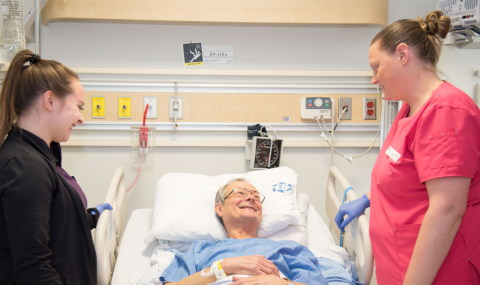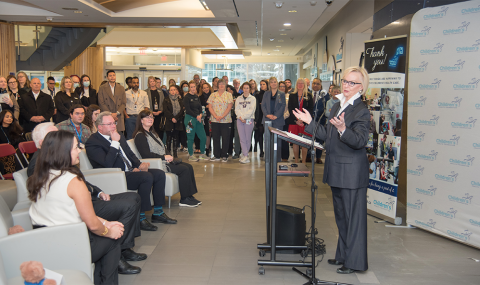MEDIA RELEASE
For Immediate Release
June 29, 2012
One patient shares his journey to mark Stroke Awareness Month
LONDON, Ontario – We’ve all heard the expression ‘life can change in a heartbeat’, but for one London resident, one heartbeat literally did change life as he knew it. While sitting in a restaurant one December afternoon, 57 year old Peter Innes began to notice that his right side was becoming numb and weak. Before he could comprehend what was happening, he found himself collapsed onto the table in front of him, unable to move. Moments later, he was in an ambulance on his way to London Health Sciences Centre’s University Hospital Emergency Department. Innes had experienced a massive stroke, caused by a blood clot which formed near his heart and travelled to the left side of his brain.
“Approximately 30% of strokes can be attributed to heart problems, as was the case for Peter,” says LHSC Neurologist Dr. Richard Chan. “And for those patients, as with any stroke patient, the recovery that follows can be a long and difficult one, both physically and psychologically”.
For Innes, that recovery included months of rehabilitation, and a complete change in lifestyle. Once an accountant in a busy accounting firm, he found it difficult to take part in group decision making, and the pace was a tiring one. He retired from his practice, with a focus not only on continuing his recovery, but also on giving back to his community. Innes knew that his accounting skills, which remained intact following his stroke, could be put to good use on a voluntary basis, so he decided to become the treasurer of several organizations which he felt were a good fit for him. Innes has also recently joined a pilot project at LHSC which is aimed at helping new stroke patients understand and work through the challenges that face them by providing them with a trained volunteer who is also a stroke survivor, who calls them on a regular basis to check in and provide support and an understanding ear.
“As you go through rehabilitation after a stroke, it is important to understand that how you approach the challenges you face has a direct impact on your recovery. I knew that staying active, and helping others was an important part of that journey for me. If I can do something positive for someone else, then I’ve done the job I’m meant to do”, says Innes. It is this attitude which helped him when he faced another stroke in May, this time affecting the right side of his brain, and in turn, the left side of his body.
For Dr. Chan, the improvement in Innes following these strokes has been remarkable, and can be attributed not only to his perseverance in his rehabilitation, but also to the efforts he has made to turn what could have been a very dark time into something positive and rewarding.
“There is more to my job than helping a patient to walk or talk again. I want patients to feel like the valued members of society that they are, and to understand that they can still make important contributions to their community. Peter is a perfect example of someone who has taken that to heart.”
As Stroke Awareness Month comes to an end, it is important to remember the warning signs of stroke, and to get help immediately if they should appear.
Stroke warning signs
Weakness - Sudden loss of strength or sudden numbness in the face, arm or leg, even if temporary.
Headache - Sudden severe and unusual headache
Trouble speaking - Sudden difficulty speaking or understanding or sudden confusion, even if temporary.
Dizziness - Sudden loss of balance, especially with any of the above signs.
Vision problems - Sudden trouble with vision, even if temporary.
Source: Heart and Stroke Foundation
About London Health Sciences Centre
London Health Sciences Centre has been in the forefront of medicine in Canada for 137 years and offers the broadest range of specialized clinical services in Ontario. Building on the traditions of its founding hospitals to provide compassionate care in an academic teaching setting, London Health Sciences Centre is home to Children’s Hospital, South Street Hospital, University Hospital, Victoria Hospital, two family medical centres, and two research institutes – Children’s Health Research Institute and Lawson Health Research Institute, a joint research initiative with St. Joseph’s Health Care London. As a leader in medical discovery and health research, London Health Sciences Centre has a history of over 50 international and national firsts and attracts top clinicians and researchers from around the world. As a regional referral centre, London Health Sciences Centre cares for the most medically complex patients including critically injured adults and children in southwestern Ontario and beyond. The hospital’s nearly 15,000 staff, physicians, students and volunteers provide care for more than one million patient visits a year. For more information visit www.lhsc.on.ca
- 30 -
For media inquiries contact:
Kathy Leblanc
Corporate Communications and Public Relations
London Health Sciences Centre
519-685-8500, ext. 74772
kathy.leblanc@lhsc.on.ca
After-hours assistance:
Call LHSC Switchboard at 519-685-8500 and ask to page the communication consultant on-call


